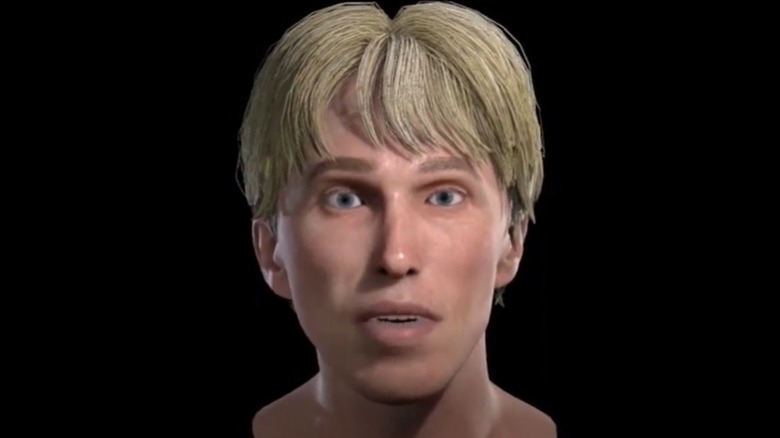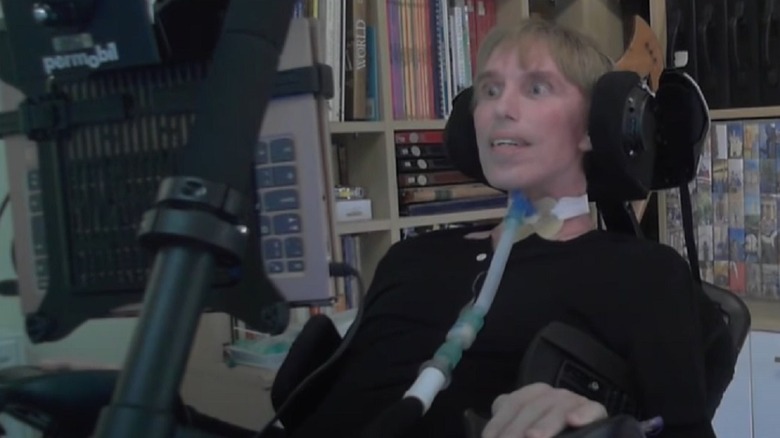The Tragic Death Of The English Scientist Known As The World's First Human Cyborg
On June 15, 2022, Dr. Peter Scott-Morgan's family issued a statement on his Twitter account that announced his death at 64 years old. Scott-Morgan was an American-British scientist known as the world's first full cyborg. In 2017, Scott-Morgan was diagnosed with motor neuron disease (MND), also called amyotrophic lateral sclerosis (ALS). MND is a rare condition that affects the nerves and brain. Some of its symptoms include weak legs, slurred speech, muscle cramps, and a weak grip (via National Health Service UK). Currently, there is no known cure for the disease, but patients with MND can undergo treatments to alleviate its symptoms.
Dr. Scott-Morgan was given two years to live when he was diagnosed in 2017. Despite his progressing illness, he remained optimistic about life and found ways to cope with his condition. He always believed that technology will be able to save him. "All my early science education came from 'Dr. Who' and 'Star Trek.' They taught me that if you're smart enough, brave enough, and have access to technology, anything's possible," he stated, according to Input Magazine. Scott-Morgan decided that he would do whatever he could to live longer, and he did that by undergoing a series of surgeries and transforming himself into a cybernetic organism, part human and part machine. "I am a prime candidate for the fast track to death, but I will pass on the offer. I am frankly far too busy having fun," he said.
Dr. Scott-Morgan's transformation
Dr. Peter Scott-Morgan had the idea to remove the functions of his organs before they started failing due to MND. As reported by the National Health Service UK, an MND patient's symptoms increasingly worsen over time. Moving, swallowing, and even breathing eventually get harder as time passes. Patients undergo a combination of treatments including physiotherapy and occupational and speech therapy, as well as a well-balanced diet.
Scott-Morgan developed an avatar of his face before his muscles failed to function. The idea was for the robotic face to correspond with the movements of the body with the use of artificial intelligence. He then went under the knife for a triple-ostomy in 2018, per Input Magazine. He worked with physicians, designers, and technology experts to be able to function. His goal was to rely on artificial intelligence to give solutions to people who have to live with extreme forms of disabilities. Initially, doctors were hesitant to work with Scott-Morgan about his plans, as there were risks involved that could progress the disease or even leave him dead. However, the optimistic scientist was adamant, and he eventually found people to support him.
Next, he had his voice box removed to prevent him from aspirating on his own saliva. He developed a way to communicate using a voice synthesizer, and it turned out sounding almost like his real voice and not too robotic (via Times Now News). In 2019, Scott-Morgan bid farewell to his former self and completed his transformation into a full cyborg that he called Peter 2.0.
The first human cyborg's death
In 2020, a documentary titled "Peter: The Human Cyborg" was released. It focused on the scientist's journey of transitioning into a cyborg. Footage of his life was filmed for two years, from the planning stages with a team of experts up to the surgeries that he underwent (via IMDb). Near the end of his life, Peter Scott-Morgan's MND had significantly progressed, but thanks to his innovations, he was able to stand up, use a computer using eye-tracking, and communicate with others. After the success of his transformation, he said that he wasn't merely surviving with his disease; he was thriving.
Before his death, the scientist's muscles have atrophied and he had to use a catheter and colostomy bag. He was confined to a high-tech wheelchair that allowed him to lie down and stand up, per The Daily Mail. In the announcement of his death, it stated that Scott-Morgan died surrounded by his family and closest friends. Those who worked with him were saddened by the news, but his legacy continues. The Scott-Morgan Foundation is an organization that makes use of AI technology to improve the lives of those who are extremely disabled. Scott-Morgan once said that he was lucky to be a cyborg prototype and show the world the immense possibilities in revolutionizing humanity, as reported by the New York Post. Through his persistence and positivity, he was able to prolong his life and give hope to those who are extremely disabled.


